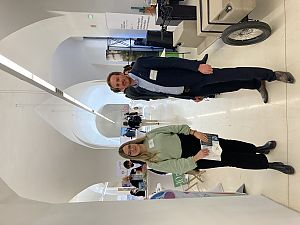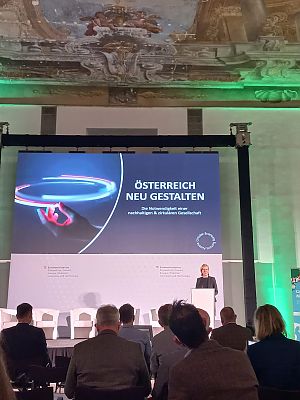Circular Economy Summit Austria: Space data support circular economy in Austria

Around 50 percent of global greenhouse gas emissions are attributable to the extraction and processing of resources. Although resource consumption in Austria stabilised in the years from 2010 to 2018, it did so at a very high level. Domestic material consumption in 2018 was 19 tonnes per capita and year, 5 tonnes above the European average. More than half of this was accounted for by non-metallic minerals, mainly construction raw materials, just under a quarter by biomass, 15 per cent by fossil fuels and 5 per cent by metals. Keeping resources in the cycle is therefore of great importance in terms of environmental and climate policy.
Climate Protection Minister Leonore Gewessler has therefore initiated the development of a circular economy strategy for Austria and, at the Circular Economy Summit Austria, initiated a comprehensive discussion on how to reduce resource consumption and strengthen the circular economy.
"Unfortunately, we are still far too wasteful with our valuable resources. This is bad for our environment and is also economically unreasonable. Because currently only about ten percent of products and raw materials are recycled. The remaining 90 percent are simply disposed of at the end of their life cycle. We need to recycle raw materials and resources much more - this is the only way to achieve our climate protection goals and make Austria fit for the future," says Climate Protection Minister Leonore Gewessler.

Space technology for a successful circular economy
The aim of the event is to bring pioneers of the circular economy in Austria before the curtain, to learn from these best-practice examples and to discuss the key points of the new circular economy strategy for Austria. Leading CEOs will speak about the importance of the circular economy for the location and their companies. Around 40 Austrian companies and organisations will also present their work at a "Circular Economy Fair" during the Summit.
The great interest in the Circular Economy Summit shows the importance of this topic for the future. More than 600 people registered for the event and participated on site or online. The participants came from various fields of business, research, politics and civil society. Stakeholders from the Austrian space sector were also represented. For example, the founders of the red-white-red start-up Beetle ForTech, Koimé-Simon Kouacou and Sebastian Vogler, impressively demonstrated how the timber sector in Austria, and even globally, can become more sustainable with the help of space data and technology.
Circular economy = successful economy
"We only have finite resources available on our planet. We have to use them carefully, especially when it comes to products and raw materials that we need every day. If you want to be successful in the future, you cannot avoid the circular economy. The circular economy is an integral part of successful companies. Because it saves resources, is good for our environment, and provides an economic and competitive advantage," adds Climate Protection Minister Gewessler.
Concrete examples of future-oriented circular economy are presented in the four particularly resource-intensive sectors of construction, textiles, mobility and food. Furthermore, challenges in the measurability of circular economy and options for monitoring progress were discussed.
